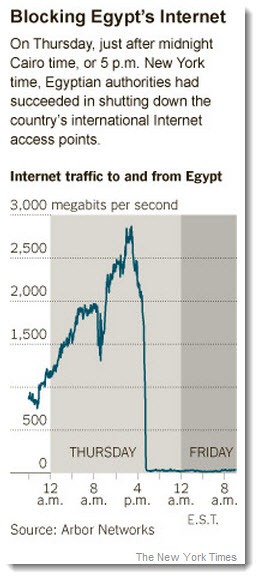As internal unrest in Egypt worsens, the government has cut off nearly all Internet traffic into and out of the country.
A few days ago the government cut off access to social networking websites, including Facebook and Twitter. Today the entire country is offline after the four companies that handle virtually all traffic were ordered to shut down.
At the same time, the government has begun to shut down cellphones in selected areas, according to the New York Times.
Here’s a nice summary in The Atlantic of how this was achieved and what the implications are. Basically, Egypt has a relatively small number of cables carrying Internet traffic into the country, and the four major ISPs followed orders from the government to shut everything down.
Quoting the head technology officer at a monitoring firm: in the blink of any eye, “every Egyptian provider, every business, bank, Internet cafe, website, school, embassy, and government office that relied on the big four Egyptian ISPs for their Internet connectivity is now cut off from the rest of the world."
How is it possible to take a whole country offline? Well, the telecom companies operate under strict licenses from the government and only four companies handle virtually every connection. There might only be a few fiber optic cables going across the borders. It’s not quite like pulling a plug; instead, the ISPs withdrew routes from the global Internet routing table, leaving no valid paths for traffic to be exchanged with the rest of the world. Interestingly, as of a few hours ago there were still a handful of routes available for one company, the Noor Group – one of whose customers is the Egyptian Stock Exchange.
This could never happen in the U.S., of course. It’s not like the telecoms in this country would compromise their customers’ privacy and turn off web sites simply because the government demanded it. Right?

